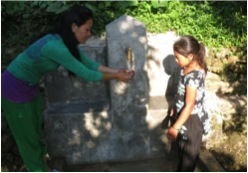Tika (left) and Dhanseri (right), female water supply caretakers, Lamidamar, Nepal. Photo: Amanda Binks, Engineers Without Borders Australia
EWB volunteers have worked with NEWAH to create innovative approaches to WASH challenges, develop water safety plans and engage the community in the processes. EWB is also assisting NEWAH with a climate change adaptation program and a rainwater harvesting and recharge program.
NEWAH are sector leaders in their approach to equity and inclusion in their programming, ensuring their programs don’t further marginalise those who have greater barriers in accessing to WASH services. Recently a case study from EWB and NEWAH has been published as part of the WaterAid Inclusive WASH initiative, entitled “Water, Sanitation and Hygiene is a connector, not a divider: An inclusive WASH case study”.
The case study focuses on residents of Nepal’s remote hill areas that face a number of difficulties in accessing WASH services. It specifically focuses on the socially excluded and ultra-poor members such as the elderly, people living with HIV / AIDS and people with a disability.
Throughout the project NEWAH recognised a lack of institutional support for inclusive WASH as not only a key barrier to WASH access but also as a significant opportunity to improve the delivery of their WASH projects in Nepal. To act on this opportunity, NEWAH have drafted a Gender and Social Inclusion Policy (GSI) to guide their work.
A core principle of all NEWAH’s work is that projects must be implemented in a community-led manner and all arrangements are socially and gender inclusive. When communities are given control of the planning processes, they are able to direct discussions towards the core issues underpinning barriers to WASH access, and ultimately own decisions made on the project. This is achieved through a planning and implementation process that involves detailed household surveys, focus groups that include key social informants such as religious leaders, tailors and teachers and mass meetings with one member from each household.
NEWAH’s work on gender and social inclusion has had impacts at a national level with NEWAH contributing to the Nepal National Rural Water Supply and Sanitation Policy (NRWSS) by the Government.
Community contact and support visits are maintained for two years following the conclusion of each project, and these visits have confirmed that in the case of HIV and disability, changes have been sustained, both in terms of reduced stigma and improved quality of life due to better access.
Babisera, a year old with a severe disability who is unable to move without assistance, spends the majority of her time in bed and has been forced to defecate where she lies in bed. Through NEWAH’s process her community proposed to support her family to construct a disability friendly latrine which featured a wheelchair level seat with arm rests to overcome her balance challenges. The specialised latrine has made a world of difference to Babisera and her family. Her mother no longer spends hours a day cleaning bedding and states that Babisera has even begun to communicate with family members, indicating when she needs to go to the toilet. Her increased communication has brought much joy to all family members and a hope for a happier, more dignified future.
Read the full report
EWB has recently commenced a participative review of its equity and inclusion approach covering things like gender, disability and the ultra poor. Over the coming months EWB will be developing its approach for equity and inclusion internally at an organisation level and within our programming and practices.
Accessible toilet constructed for Babisera and family, Nepal. Photo: Amanda Binks, Engineers Without Borders Australia


